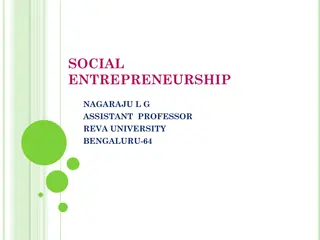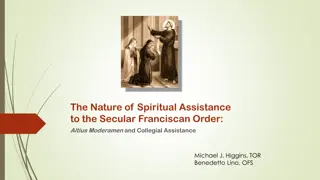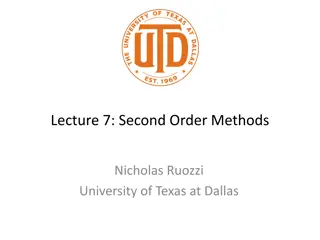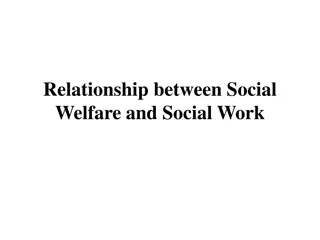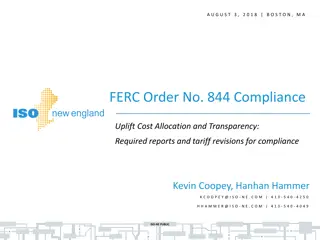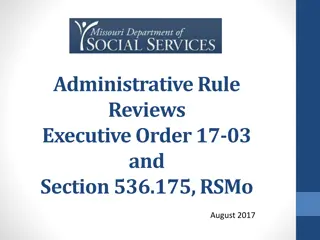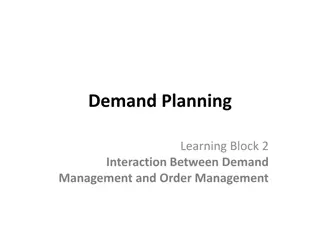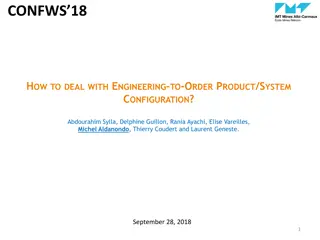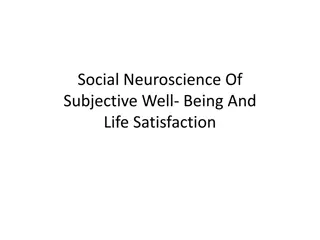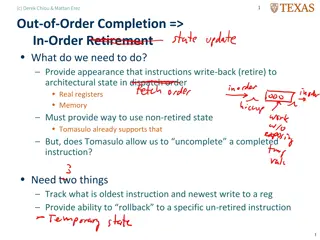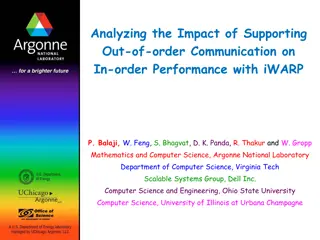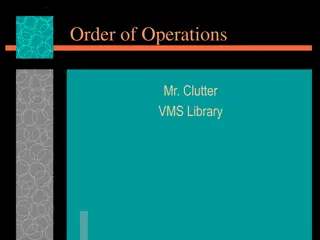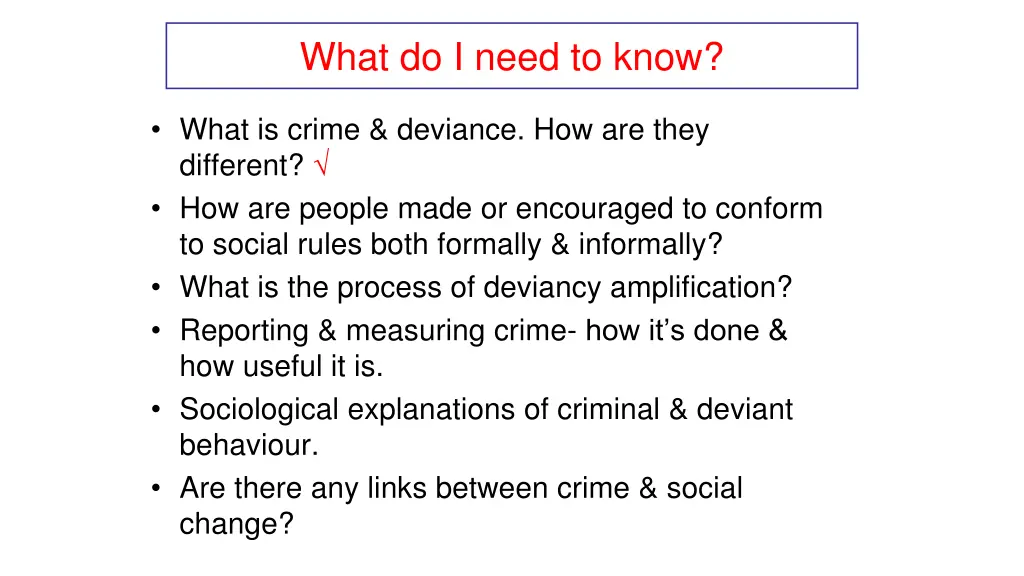
Understanding Crime, Deviance, and Social Norms
Explore the distinctions between crime and deviance, how individuals conform to societal rules, the concept of deviancy amplification, media influence on gender stereotyping, sociological perspectives on criminal behavior, and reporting and measuring crime. Uncover the links between crime and social change within different social contexts.
Download Presentation

Please find below an Image/Link to download the presentation.
The content on the website is provided AS IS for your information and personal use only. It may not be sold, licensed, or shared on other websites without obtaining consent from the author. If you encounter any issues during the download, it is possible that the publisher has removed the file from their server.
You are allowed to download the files provided on this website for personal or commercial use, subject to the condition that they are used lawfully. All files are the property of their respective owners.
The content on the website is provided AS IS for your information and personal use only. It may not be sold, licensed, or shared on other websites without obtaining consent from the author.
E N D
Presentation Transcript
What do I need to know? What is crime & deviance. How are they different? How are people made or encouraged to conform to social rules both formally & informally? What is the process of deviancy amplification? Reporting & measuring crime- how it s done & how useful it is. Sociological explanations of criminal & deviant behaviour. Are there any links between crime & social change?
Learning Objective: To recap: What is crime & deviance? How are they different?
Crime isfor example An act which breaks the criminal written law of society. E.g. murder, rape, theft, assault. Crimes can be punished by our formal criminal justice system.
Deviance is Behaviour or actions that are disapproved of by most people in society. The actions break or do not conform to that society s norms and values. E.G farting in a silent doctors waiting room. Stealing your best friend s boyfriend/girlfriend. Deviant acts are NOT THE DONE THING!
They are different because Some crimes are not deviant acts. E.g. Speeding at 90mph on the motorway. Although it breaks a written criminal law and is a punishable action, most people do not disapprove of it because most people do it and it s unlikely to harm anyone. Some deviant acts are not crimes. E.g. stealing your best friend s boyfriend/girlfriend. Although it is disapproved of by most people it doesn t actually break a written criminal law.
Deviancy can change depending on the time and place that the action is done. It is socially defined. For example Smoking is more deviant now than it used to be. More people disapprove of smoking because we are more aware of the harm it does to the smokers and other people around them. If a person is smoking it is more deviant to it near to a new baby than it is to do in a nightclub, bar or pub.
What do I need to know? What is crime & deviance. How are they different? How are people made or encouraged to conform to social rules both formally & informally? What is the process of deviancy amplification? What role does the media play in gender stereotyping? Sociological explanations of criminal & deviant behaviour. Reporting crime- how it s done & how useful it is. Are there any links between crime & social change?
Learning Objective: How are people made or encouraged to conform to social rules both formally & informally? E.g. Why don t people smoke near babies?
Starter Task: 1. Why do people follow rules? 2. Why do people not follow rules?
Social Control is Social control is: The process by which people are persuaded to obey the rules, norms & expectations of society.
Social Order is Social order is: When everybody works together and follows society s rules, norms & expectations. This makes society a happy and safe place to live.
Imagine you have been put in charge of behaviour at your school / college. You re being paid to achieve social order. Would you either: 1. Let the pupils agree on how they expect each other to behave. As the pupils agree no sanctions are needed. OR 2. let the teachers decide the rules of the school and the sanctions that will happen when rules are broken (like now)
The Consensus Approach thinks people follow rules because We are brought up to have the same norms and values and want the same things from life. We agree that rules are there to support us in achieving the ideal society so most people are happy to follow them.
The Conflict Approach thinks people follow rules because The people in charge decide most of society s rules & put consequences in place for when we don t follow them.
Written rules Written rules are everywhere and direct much of our behaviour. At school there are written expectations of behaviour, the highway code is a written rule book for driving, and on buses, planes and trains there are signs telling you what to do & what not to do. School Rules 1. Don not take other peoples belongings 2. Hands up! 3. Don t talk when the teacher is.
Written Rules List three of our school s rules or expectations. For each one say why you think it is a necessary OR unnecessary rule. Do you think society needs rules? What would happen if either we had no rules or people chose to ignore all rules?
Agencies of Formal Social Control Agencies of formal social control exist to make sure people stick to the written rules of society.
What happens to people who break the written rules of society? Discuss the consequences of the following actions Murder Rape Theft Assault Speeding Drink driving If you did one of these actions what might happen?
Agencies of Formal Social Control How do we get people to obey written laws & what happens if people break written laws? 1. The Government are know as the legislature, they actually create & invent the laws that tell us how to behave. E.g. it is illegal to steal another person s belongings. 2. The Police try to enforce those laws. When a written law is broken they respond to the complaint and investigate what happened. 3. The Judges and Law Courts deal with criminals who have been caught by the Police. They look at the case and find the person guilty or not. Guilty criminals are sentenced with either community service, fines or time in prison. 4. The Prison service lock up criminals to protect society from them and also act as a deterrent to others thinking of breaking laws. Prisons also try to rehabilitate criminals so that they won't break laws again when they are released. On your worksheet briefly say what each part of the system does.
Agencies of Informal Social Control We generally know what actions are approved of or disproved of by others and we learn this in an informal way through informal agencies of social control. When we act in a particular way our peers, family or workmates will react depending if the action is desired or not.
Taken-for-granted rules We take much of our behaviour for granted and don t even realise that we are conforming to taken-for-granted rules. They are learnt subconsciously through socialisation. E.g. at home you d happily make a cup of tea or take a shower without asking. But at a distant relatives or friends house or in a restaurant you would not help yourself to cups of tea or nip for a quick shower without causing shock and confusion!
Taken-for-granted rules Give two examples of taken-for-granted rules. Think about interviews, holidays, toilet habits, relationships with others etc!
Think Super Nanny!!! When the children misbehave they are sent to the naughty step, when they behave in the correct way they receive hugs, praise and sometimes rewards- in an informal way this controls the child s behaviour.
Unwanted behaviour 1. If you misbehave at home what happens? 2. If you fall out with friends because of something you or them has done what happens? Unwanted behaviour receives negative reactions such as ridicule, ignoring the person, playing practical jokes on the person, gossiping about them, physically harming them or discussing/ arguing with them about their actions.
Wanted Behaviour 1. What happens at home if your help clean up, get good grades or are generally very good? 2. What do you do for your friends if they ve really helped you or been nice? Wanted behaviour receives positive reactions to encourage more of the same and reward the correct actions. You would praise the person, give them gifts, maybe promote them or give them physical love and attention.
Socialisation Socialisation is the process by which we learn the rules or expected behaviour of society and we learn the consequences of conforming or not to society s norms. The family, media, peers, religion, school & workplace are all agencies of socialisation- they can prevent people becoming deviant or criminal. People who lack family support or don t attend school can be more likely to commit crimes dues to lack of informal social control.
What is deviancy amplification? The process of deviancy amplification basically takes a deviant act or crime. The deviant act or crime is focussed on by the media and as a result that act is amplified (made into a bigger issue or made more common than it was before.)
Deviancy Amplification Deviancy Amplification is a theory that explains how some deviant acts or crimes become more common. According to theory, the spiral starts with a deviant or criminal act taking place e.g. knife crime. The media reports on the act and focuses on it on TV in the papers, on the radio etc. As a result, minor problems begin to look serious and rare events begin to seem common. People become more aware of the issue, they get interested in it and as a result the acts are sometimes glamorised and so can seem less deviant or more normal. Public concern and interest in the act often forces the police and the whole formal social control system to focus more resources on dealing with the specific deviancy. Judges and magistrates under public pressure give harsher sentences for those crimes. Politicians under pressure pass new laws to deal with the perceived threat. All this tends to convince the public that any fear was justified while the media continue to profit by reporting police and other law enforcement activity. Can you think of anything in the news over the past few weeks, months or years that the media have really focussed on and as a result the crime or act has become a big issue in society.
Deviancy Amplification Through the process of deviancy amplification the public are more concerned and interested in knife crime. Over the past couple of weeks there have been a few people killed or seriously injured by knives. The media reported the murder of a London Police women, within days more and more knife crimes were being reported in the papers. Within a week knife crime seemed to be a major problem in society. The public are panicking, a knife amnesty has been announced where people are encouraged to hand in knives to the police. People are calling for harsher knife laws and sentences for knife related crimes. Do you think that all of a sudden more people are stabbing other people or does it just appear to be a bigger issue because the media are on the watch for knife crimes, the police are reacting to public demand and searching more people and judges are punishing knife related crimes with longer or harsher sentences.
Task: Deviancy amplification often happens in school. Here instead of the media, the teachers choose one issue to focus on and then the issue seems to be worse then it really is. Can you think of an example? Discuss it with a partner and try to say how the deviant act is amplified (made to seem a bigger problem than it really is) by school.
What do I need to know? What is crime & deviance. How are they different? How are people made or encouraged to conform to social rules both formally & informally? What is the process of deviancy amplification? Reporting & measuring crime- how it s done & how useful it is. Sociological explanations of criminal & deviant behaviour. Are there any links between crime & social change?


